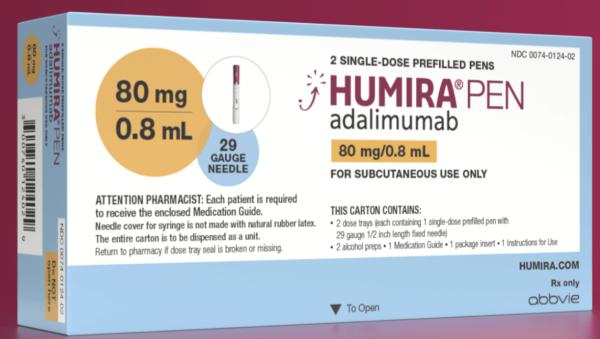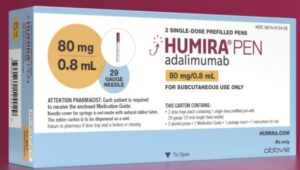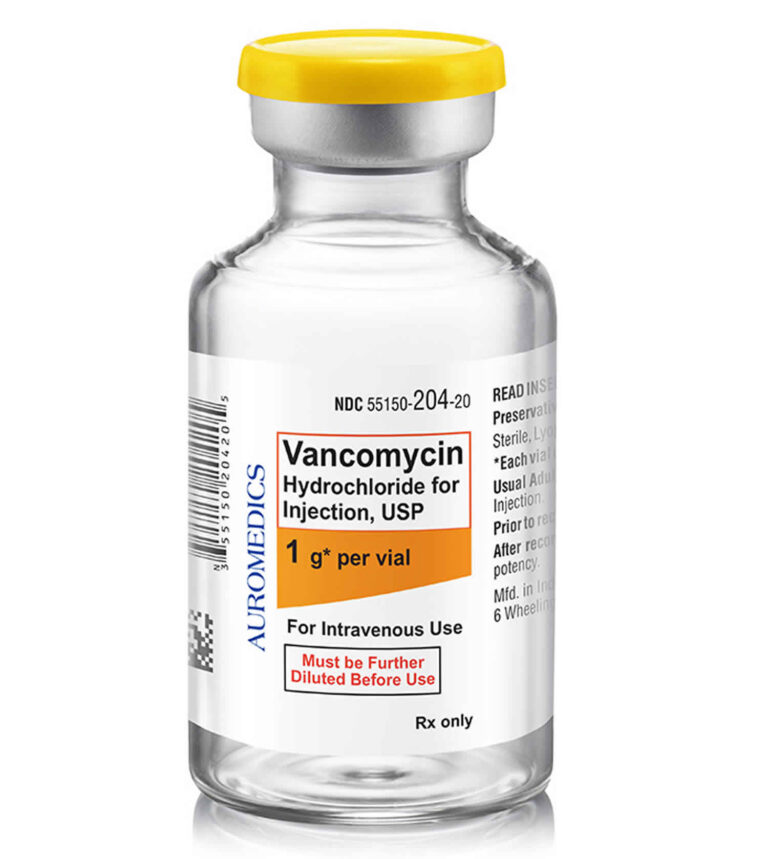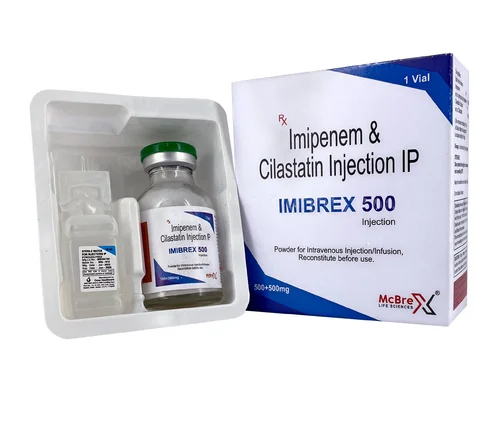
Adalimumab (Humira) is a biological medication used for the treatment and management of several inflammatory disorders. It targets and inhibits tumor necrosis factor-alpha (TNF-α), a cytokine that plays an important role in systemic inflammation. The inhibition of TNF-α by adalimumab leads to a decrease in inflammation, alleviation of pain, and mitigation of tissue damage. This medication is indicated for a variety of autoimmune conditions, such as rheumatoid arthritis, psoriatic arthritis, Crohn’s disease, and ulcerative colitis, among others.

Brand names: Humira, Amjevita, Yusimry, Cyltezo, Yuflyma
Dosage form: Subcutaneous injection by Autoinjector, Pre-Filled Syringe, Single-Dose Vial
Drug classes: Antirheumatics, TNF alfa inhibitors
How Adalimumab works?
Adalimumab is a monoclonal antibody that selectively inhibits tumor necrosis factor-alpha (TNF-α), which is a cytokine that promotes inflammation. TNF-α is integral to the inflammatory processes affecting joints, skin, and other tissues, and its overproduction is linked to the onset of autoimmune disorders. By attaching to TNF-α, adalimumab obstructs its ability to bind to cellular receptors, which diminishes the inflammatory response. This mechanism is effective in alleviating symptoms such as pain, swelling, and joint deterioration that are characteristic of numerous autoimmune diseases.
Uses of Adalimumab
Adalimumab is used for the management of various autoimmune and inflammatory disorders, including the following:
1. Rheumatoid Arthritis
In this condition, the immune system involves targeting the joints, resulting in pain, inflammation, and potential long-term damage to the joints.
2. Psoriatic Arthritis
This type of arthritis is associated with psoriasis and is recognized as joint pain and swelling in affected individuals.
3. Crohn’s Disease
It is a form of inflammatory bowel disease (IBD) that disturbs the gastrointestinal system, leading to symptoms such as abdominal discomfort, diarrhea, and unintended weight loss.
4. Ulcerative Colitis
This condition affects the colon, resulting in inflammation and ulceration within the digestive tract.
5. Ankylosing Spondylitis
This arthritis variant predominantly affects the spine, which results in significant pain and stiffness.
6. Hidradenitis Suppurativa
A dermatological condition marked by painful nodules and abscesses in regions such as the armpits and groin.
7. Plaque Psoriasis
A chronic autoimmune disorder in which there is accelerated proliferation of skin cells, which results in the formation of scaly, red patches on the skin.
Adalimumab Side Effects
Adalimumab also has some side effects, some of which can be severe.
Common and relatively mild side effects
- Reactions at the injection site- This may manifest as redness, pain, or swelling.
- Headaches
- Upper respiratory infections- Symptoms include nasal congestion, sore throat, and cough.
- Nausea
- Skin rashes
More serious side effects
- Heightened infection risk
As adalimumab suppresses the immune system, it can lead to increased vulnerability to infections, including tuberculosis, bacterial, and fungal infections.
- Hematological disorders
This may result in reduced levels of blood cells, including white blood cells, red blood cells, and platelets.
- Hepatic complications
Patients may experience elevated liver enzymes or, in severe cases, liver failure.
- Cardiovascular issues
There is a potential risk of heart failure, especially in individuals with pre-existing heart conditions.
- Neurological complications
Patients may report symptoms such as changes in vision or seizures.
- Cancer risk
There is an increase in the risk of certain malignancies, particularly lymphoma.
- Severe allergic reactions
Symptoms may include difficulty in breathing, facial or throat swelling, and hives.
Warnings
1. There is an Increased risk of infections. Adalimumab may weaken the immune system. Thus, it is required to screen patients for tuberculosis and other infections before starting treatment.
2. There could be an increased risk of malignancy or the risk of certain cancers, especially lymphoma.
3. Adalimumab can worsen the condition of patients with heart failure.
4. Patients on adalimumab should avoid live vaccines as the medication can suppress immune responses.
5. Adalimumab should only be used in pregnancy if there is no other option left, and it is recommended to consult with a healthcare provider.
Before Taking Adalimumab`
Before starting adalimumab, inform your healthcare provider if the patient has any of the following conditions:
- Active or recent infection
- Tuberculosis (TB)
- History of heart failure
- Liver disease
- Allergies to adalimumab or any of its ingredients
- A history of certain types of cancer
- Blood or immune system problems
- Pregnancy or breastfeeding
How to Use Adalimumab
Adalimumab’s administration is through injection. Patients need to learn to inject it themselves in the thigh or abdomen. It can be done at home or in a medical facility.
Important instruction before injecting Adalimumab
- Let the vial or pen reach room temperature for 15-30 minutes before injecting.
- Maintain good hygiene before the injection to lower infection risk.
- The dose depends on the condition and how the patient responds. Generally, it is given every other week, but this can change.
Dosing Information
The dosing for adalimumab varies by condition:
- In the case of Rheumatoid arthritis, Start with 40 mg every other week, possibly increasing to weekly for some.
- For Crohn’s disease, Begin with 160 mg (four injections), then 80 mg two weeks later, followed by 40 mg every other week.
- For Psoriasis, Usually starts with 80 mg, then 40 mg every other week.
- The dose for Ankylosing spondylitis is 40 mg every other week.
The doctor will decide the right dose for each patient.
What to Do If You Miss a Dose
If you miss a dose, follow the instructions from your healthcare provider. When you remember about a missed dose, then take it immediately If it’s almost time for the next dose, skip the missed one and continue with your regular schedule.
What to Do If I Overdose?
If you think you have taken too much, get medical help right away. Signs of an overdose can include stronger side effects, like worse infections or strange reactions. Treatment may include supportive care and monitoring by medical staff.
What Should I Avoid While Taking Adalimumab?
- Stay away from live vaccines: Because adalimumab weakens the immune system, do not get live vaccines while on this treatment.
- Avoid infections: Since adalimumab can raise the risk of infections, keep away from people who are sick.
Drug Interactions of Adalimumab
Adalimumab can interact with several other medications, such as:
- Immunosuppressants
Medications like methotrexate or corticosteroids can raise the risk of infections when taken with adalimumab. - Biologics
Other biologic treatments for autoimmune conditions should not be used at the same time as adalimumab unless advised by a healthcare professional. - Live vaccines
These should be avoided during adalimumab treatment.
Patients need to inform their healthcare providers about all medications they are taking, including over-the-counter drugs, supplements, and vaccines.
Conclusion
Adalimumab is an effective treatment for various autoimmune and inflammatory disorders. It provides significant benefits by lowering inflammation and preventing long-term tissue damage. However, patients need careful monitoring for infections and other serious side effects.



